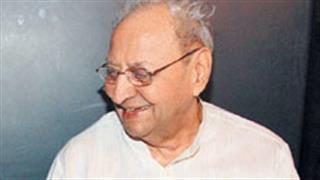Asha Parekh, whose girlish laughter added to the charm of her films through the 1960s and 1970s,
refuses to cling on to the past.
"I don't believe in sitting at home clinging to the past wiping photo frames with my tears...Please,
there's so much more to do in life," said the actress who turned a year older Saturday - may be on the
wrong side of 60.
She had a fair share of hits.
"Sure I had hit films and have the memories but I refuse to dwell on them. It was a great time."
"I share my birthday with that other far, far greater Gujarati, Mahatma Gandhi. But unlike him, I was
anything but a peace ambassador. Whenever I entered the studio everyone would run for cover," said
Asha, her girlish spirit intact.
She once hid Sunil Dutt's slippers in a chair. "Forget finding it that day, he didn't find it for many years
until he was again shooting in the same studio," her laughter reverberates across the room.
"Like Latabai (Mangeshkar) whose birthday comes three days before me, I believe you're as young as
you think," said the actress who was considered the most successful among her contemporaries -
Sadhana, Sharmila Tagore, Mala Sinha and Waheeda Rehman, who were all superstars in the
1960s.
But it was Asha who was considered the lucky mascot.
The hits rolled out with assembly line regularity with every leading man from Joy Mukherjee ("Phir Wohi
Dil Laya Hoon", "Love in Toyko") and Biswajeet ("Mere Sanam") to Shashi Kapoor ("Pyar Ka Mausam")
and Rajesh Khanna ("Aan Milo Sajna") getting his share of hits.
Having known her very closely for years, I find her to be extremely affable. She's a storehouse of
chuckling memories.
Once for a scene, Joy Mukherjee had to pick her up and carry her to the bed. But he apparently
couldn't take her weight and simply flung her on the hard bed. "I was confined to bed with a back
problem for weeks," she recalls with affectionate annoyance.
With Amitabh Bachchan there was a misunderstanding. "Apparently he was told that I refused to work
with him when no such thing happened. We didn't come together until many years later when I played
his bhabhi in 'Kaalia'. By then I had decided to pack it in.  "No more bhabhi or mother roles for me. I can't bear to see myself sobbing for some undeserving male
who's out busy fighting the goons while I make his favourite dishes in the kitchen. I'd rather be out there
doing all the 'dishum dishum'."
"No more bhabhi or mother roles for me. I can't bear to see myself sobbing for some undeserving male
who's out busy fighting the goons while I make his favourite dishes in the kitchen. I'd rather be out there
doing all the 'dishum dishum'."
The actress laughs at the memory of those spectacular days when they had nicknamed her "Jubilee
Parekh".
Her intimate association with filmmaker Nasir Husain yielded some of the biggest successes of the
1960s.
From the time Husain introduced Asha Parekh in "Dil Deke Dekho" in 1959 to their last film together,
the mammoth musical blockbuster "Caravan" in 1971, the director-actress team was
unbeatable.
"Nasir Saab gave me some of my biggest hits. He also de-glamorized me in 'Baharon Ke Sapne'.
Though the film didn't click - no one wanted to see Asha Parekh with parched lips and hungry eyes -
the songs 'Aaja piya tohe pyar doon', 'Chunri sambhal gori' and 'Kya janoon sajan' are perennial
favourites.
"Later I got a chance to prove myself as an actress in Shakti Samanta's 'Kati Patang' and Raj Khosla's
'Main Tulsi Tere Aangan Ki'."
"Yeah there were lots of successes with a whole lot of heroes. I really enjoyed working with Shammi
Kapoor in 'Teesri Manzil' and 'Jawan Mohabbat'. I call him Shammi Chacha to this day. There was never
any hanky panky with any of the heroes. I was too much of a tomboy for them to contemplate affairs
and flings with me."
Not even with Dharmendra who was known to be a pucca ladies' man?
"Not even Dharam," she chuckles. "When we did films like 'Aaye Din Bahar Ke' and 'Aaya Saawan
Jhoom Ke' together, I drew the lines in our friendship very clearly... Not that I lived like a nun or
anything. Far from it. I was a nice maiden but not an ice maiden." Her laughter rings across her well-appointed
new apartment. She moved into it last year after selling off her famous stone-and-granite seaside
bungalow that was considered quite a tourist attraction.
Far from it. I was a nice maiden but not an ice maiden." Her laughter rings across her well-appointed
new apartment. She moved into it last year after selling off her famous stone-and-granite seaside
bungalow that was considered quite a tourist attraction.
"It was becoming hard to manage on my own. My father was increasingly unwell and I had to
single-handedly look after the huge household. I moved into this place with my Papa. It's just a stone's
throw away from my old home.... Now my father is also gone. It's just me," her voice trails off.
She instantly cheers up as she begins to talk about her future plans. "I've a serial on air on Sahara.
And I'm now in negotiation with Doordarshan...There's so much I want to do...Maybe I won't be able to
do them all. But at least I tried."
Asha Parekh turns a year older
Monday, October 04, 2004 12:30 IST



















